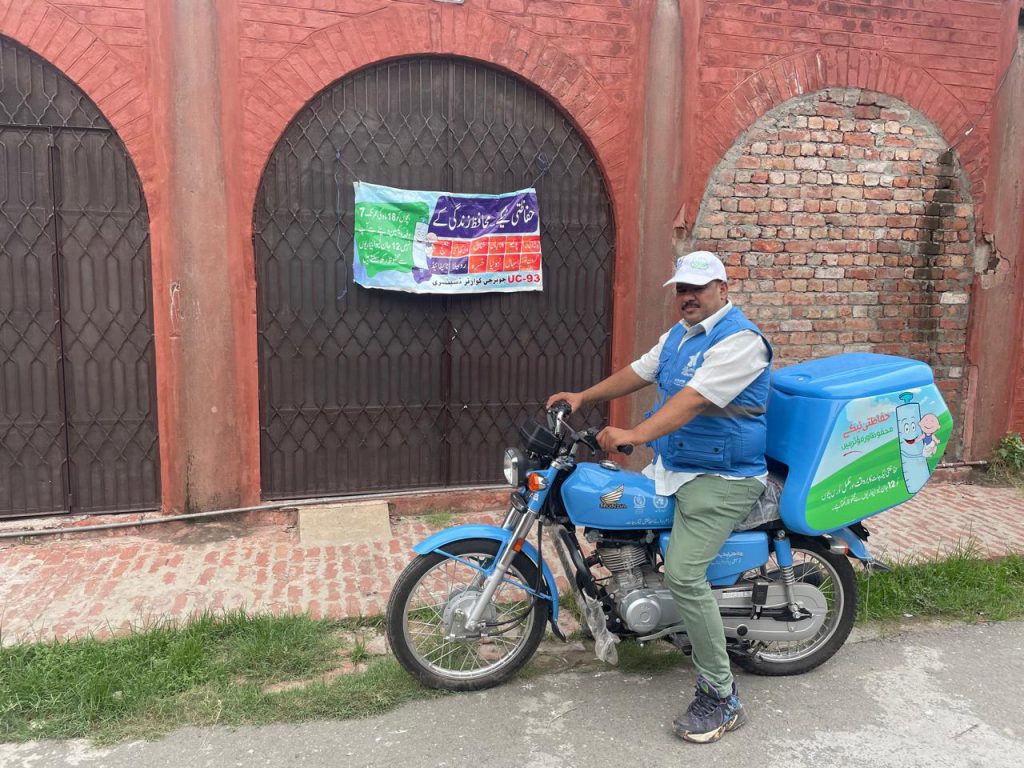In a landmark move to strengthen Pakistan’s healthcare outreach, 800 motorbikes have been handed over to the Expanded Programme on Immunization (EPI). This initiative facilitated by the collaboration between global health partners aims to extend immunization services to Pakistan’s most inaccessible regions, ensuring that no child is left behind due to distance or terrain.
The rollout targets 65 priority districts across the country, covering approximately 32.5 million people, many of whom reside in hard-to-reach villages with poor transportation infrastructure and low vaccine coverage.
Why Mobility Matters for Public Health
One of the biggest challenges to achieving universal immunization in Pakistan is mobility. In many rural and underserved regions, vaccinators are required to travel long distances on foot or by using limited public transport often without appropriate means to preserve the vaccine cold chain.
These motorbikes address that challenge directly. With improved transportation:
- Health workers can reach children in remote and rugged areas more efficiently
- Vaccines can be safely delivered on time, maintaining temperature and potency
- Routine immunization coverage can expand, closing the gap between rural and urban access
Strategic Allocation Across Provinces
The distribution of the 800 motorbikes has been strategically planned to maximize impact:
- Sindh Province will receive around 300 motorbikes for 21 underserved districts
- Punjab will benefit from 200 motorbikes covering 10 critical districts
- Balochistan, often cited for healthcare inaccessibility, will be allocated 108 bikes for 24 districts
- Remaining bikes will be provided to districts in Khyber Pakhtunkhwa and Pakistan-administered Kashmir
This ensures a wide national reach, directly strengthening Pakistan’s immunization infrastructure where it’s needed most.
Bridging the Gap: Equity in Healthcare
Beyond logistical improvements, the motorbike initiative underscores a deeper commitment equity in healthcare. In Pakistan, disparities in access to basic health services continue to affect child survival rates and community well-being. By enhancing mobility for vaccinators:
- Zero-dose children those who have never received a single vaccine can be identified and vaccinated
- Vaccine hesitancy in isolated communities can be addressed through face-to-face engagement
- Follow-up visits and outreach campaigns can become more regular and reliable
Strengthening the Backbone of Immunization: The EPI Workforce
The EPI relies on the dedication of thousands of vaccinators and community health workers. Equipping them with motorbikes doesn’t just improve service delivery it empowers the workforce, boosting morale and efficiency.
Vaccinators will now be better equipped to manage:
- Expanded outreach schedules
- Cold-chain compliance during travel
- Rapid response during disease outbreaks
- Data collection and reporting from remote localities
This also sets a precedent for integrating logistical support into healthcare policy at the provincial and national levels.
Paving the Way for a Healthier Future
With Pakistan striving to meet its immunization and child health goals under national and global frameworks, the motorbike initiative marks a turning point. It represents more than transportation it symbolizes mobility toward stronger healthcare systems, better vaccine equity, and a commitment to public health resilience.
The next phase will focus on ensuring that vaccinators are trained to operate and maintain the vehicles, track service outcomes, and coordinate outreach schedules to maximize immunization coverage efficiently.
Conclusion
Pakistan’s immunization landscape is undergoing a vital transformation. With 800 motorbikes now mobilizing EPI teams across the country, the reach and reliability of life-saving vaccines are expected to grow dramatically. As rural communities become more connected to essential health services, this initiative will serve as a model for scalable, equity-driven public health strategies in developing countries.



Comments (0)
No comments yet. Be the first to comment!
Leave a Comment